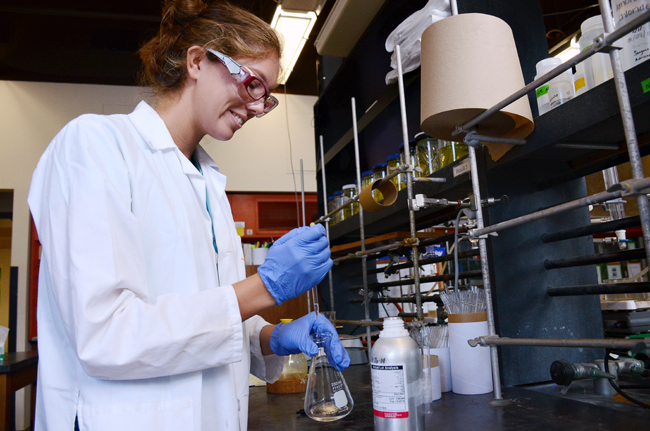In late August, UTPD reported a chemical spill involving lithium aluminum hydride — a highly water-reactive chemical — leaking on to a work bench in the Hackerman Building.
This is just one example of the types of accidents Environmental Health and Safety tries to prevent. EHS is the organization responsible for ensuring the safety of operations on campus, handling everything from food sanitation to lab safety.
“We usually get about 30-40 significant accidents per year,” said Dennis Nolan, EHS assistant director of biological and lab safety. “Those can be anything from spills in a lab, an explosion, an equipment failure or a fire.”
Nolan said there are more than 1,600 total labs on campus, and each is required to follow certain inspection and safety protocols.
“EHS inspects each lab once a year, and then lab supervisors are required to self-inspect their labs once a semester,” Nolan said.
According to the EHS “Big 12” Safety List, the most common lab accidents on campus involve chemical spills, improper eyewash cleaning and use, and chemical storage and disposal. Nolan said EHS provides training to students as part of its safety efforts.
“Every student working in a lab is required to complete basic lab safety training, and then individual labs have their own specific training,” Nolan said. “We send a newsletter called ‘The Lab Safety Update’ out every few months with information about recent accidents and training events.”
Conrad Fjetland, organic lab supervisor and chemistry lecturer, said although students take safety precautions to prevent accidents, minor incidents happen frequently in the labs.
“The minor accidents that we usually see are breaking of glassware and spilling of chemicals,” Fjetland said. “For each lab, the students wear safety goggles, proper clothing, gloves and a lab coat. If an individual experiment has a specific safety issue, it is addressed in lecture.”
UTPD works closely with EHS to take care of lab accidents, Nolan said.
“When there’s a chemical spill, fire or gas leak, lab supervisors are supposed to report it to EHS, and we report it to UTPD so the appropriate action can be taken,” Nolan said.
Nolan said EHS is continually trying to improve its safety standards, especially after major accidents occur, such as one where a lab-safe refrigerator storing more than 100 chemical containers caught on fire in Welch Hall in 2012.
“We had a safety committee come in [after the fire] and put information out about making sure chemicals were properly labeled and caps were sealed,” Nolan said. “We always try to re-evaluate standards and see what we could be doing better.”
Chemistry junior Emily Turner, who has worked in general and organic chemistry labs on campus, said she thought the University does a good job enforcing safety standards in labs.
“Even in organic chemistry, when we handled a lot of hazardous chemicals, I feel like they did a good job with training us to work in the lab,” Turner said. “I never heard about any major accidents happening.”



















